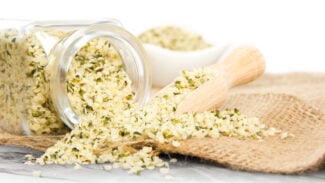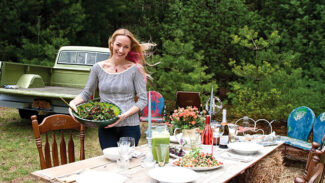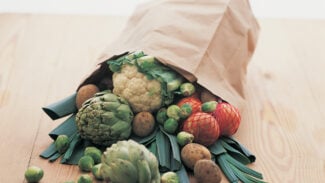Hiya Smartie,
When I blogged about plant protein a while ago, I got a lot of interesting follow-up questions. One reader’s comment struck a chord with me and inspired me to write today’s follow-up post. (If you’re curious about protein basics like understanding what a complete protein is and can eat soy, check out my first protein blog & infographic.) Here’s what this inquiring reader had to say:
Reader Question: “If I have a soy allergy and can’t have grains, gluten, and legumes, can a plant-based diet still deliver the nutrients and protein I need?”
The answer? Thankfully, yes! There are still plenty of plant-based foods that taste great and pack a protein punch. But since I know how many of you live with food sensitivities, I want to give you some tips that’ll help you identify plant-based options that won’t aggravate these issues. (If you want to read more about food sensitivities, check out this blog.)
First, I’m going to share the soy-free, grain-free, gluten-free, and legume-free (whew!) foods that are highest in protein with this infographic (perfect for printing and posting on your fridge). Once you’re armed with that information, read up on the tips I’ve included to make meal prep easy, plus some tasty plant-based protein-packed recipes.
And for all my readers with nut allergies, seeds will become your new best friends. They can be made into “seed butters” and used in place of most tree nuts in recipes.
Pea protein powder is very easily digested and is appearing up and down the vegan food aisles (it’s a great alternative to whey protein). Toss a scoop into your green smoothie in the morning to keep you energized until lunch. Now, onto this lovely infographic!
15 Protein-Rich Plant Foods (Soy-Free, Gluten-Free, and Legume-Free)
Plant-based protein can be found in these amazing soy-free vegan foods:
Hemp Seeds, Sunflower Seeds, Chia Seeds, and Pumpkin Seeds
3 tablespoons of hemp seeds pack 10 g of protein. Hemp is also high in fiber, iron, omega-3, and omega-6 fatty acids. It’s also an energy and mood booster because of its high magnesium content. Seeds from pumpkins contain 10 grams of protein per 1/4 cup (185 g) and 1/4 cup of raw sunflower seeds holds 6 grams. Two tbsp. of chia contains 6 grams. As you can see, these are all great sources of protein!
Pistachios, Walnuts, and Almonds
Pistachios contain 6 grams of protein per 1/4 cup and 1/4 cup of chopped walnuts have 4.5 grams. Almonds are another plant-based protein source! 1/4 of a cup has approximately 8 grams of protein. Almond butter is a great source of healthy fats and vitamin E.
Kale, Spinach, and Broccoli
These vegetables go to show that plant-based foods can be packed full of protein! Kale is a leafy green that holds 4 grams of protein per two cups. Spinach is another delicious green that is over 50% protein, with a high protein density of approximately 5 grams per one cup. This veggie is also a wonderful source of folate, iron, and vitamin C (and easy to add to a green smoothie!). Yet another super-green, one cup of broccoli contains 5 grams of protein per cup.
Spirulina
1 tbsp. of dried spirulina is another excellent source of complete protein, with a whopping 4 grams in a small serving. Spirulina also contains B vitamins, protein, iron, and other trace minerals. It can even help reduce inflammation (unlike animal-based proteins).
Quinoa
While it’s touted as a gluten-free grain, did you know that quinoa is actually a seed? 1 cup (185 g) of cooked quinoa contains 8 grams of protein.
Avocado
Avocado isn’t just a great source of healthy fats but also a wonderful source of protein. 1 avocado packs 7 grams of protein. Adding avocado to your diet can even help lower cholesterol.
Nutritional Yeast
Nutritional yeast isn’t just a great cheese alternative but also a decent source of protein, containing approximately 4 grams of protein in two tablespoons.
Tahini
Two tbsp. of Tahini has 5 grams of protein (and it’s great to eat with a middle eastern diet).
Other Soy-Free Protein Sources
These are all non-soy protein sources that may not be allergy-friendly but are completely fine on a vegan diet.
- Seitan: Seitan is soy-free, but contains wheat gluten. If you have Celiac Disease, this protein must be avoided.
- Legumes: Chickpeas, lentils, black beans, and kidney beans are all great protein options.
- Jackfruit: Jackfruit is a fruit whose texture is well-known for its ability to mimic meat and can be used in many recipes. It’s not an alternative that contains high protein content, but it contains some protein and is packed full of fiber.
If you’re looking for a great soy-free condiment to replace soy sauce, consider coconut aminos. They offer a similar umami taste and saltiness without the soy.
High-Protein, Allergen-Friendly Vegan Recipes
Here are six great soy-free recipes full of plant-based protein and completely void of animal products!
Quinoa Quickie
You can use quinoa instead of rice, pasta, and oatmeal. You can even form it into burgers. Yum! Try this high-protein recipe that tastes great: Sweet Potato and Quinoa Bowl With Walnuts
Magnificent Milks
For milk alternatives, try hemp milk, flax milk, or almond milk. They can be homemade or found in your local natural foods store. You can try making my favorite Basic Nut/Seed Milk recipe!
Delicious Dips
Snack on nuts and dunk veggies in dips made out of avocados, nuts, seeds, and nut/seed butters. Some of my favorites are in Crazy Sexy Kitchen. Or you can give my Artichoke Aioli recipe a try!
Scrumptious Smoothies
Start your day with a scrumptious protein-rich smoothie. You can blend almond milk, kale, frozen fruit, hemp hearts, and spirulina for a nice dose of protein in this Body Builder recipe. You can also add a plant-based protein powder for an extra kick.
Seeds-a-Go-Go
Sprinkle pumpkin or sunflower seeds on salads and soups for extra crunch and protein pow or top your pasta or salad with a nut/seed-based sauce. Try out my Dill Hemp Seed Pesto!
Be a Chia Champ
Give my Strawberry Chia Pudding a try to take advantage of their protein power.
Sample Menu: How to Get Enough Protein in Your Day
I also want to show you an example menu for a soy-gluten-grain-legume sensitive guy or gal (that’s a mouthful!). This will help you start to see how it’s possible to avoid these foods and meet your protein needs without sacrificing variety and tastiness in your diet.
Here’s how a moderately active adult who weighs 140 pounds could meet their protein needs without soy, grains, gluten or legumes (50 grams per day):
Breakfast: Body Builder = 12 g protein
Morning Snack: 1 green apple (0.5 g) + 2 Tbsp almond butter (6.5 g) = 7 g protein
Lunch: Zucchini noodles (2 g) with Dill Hemp Seed Pesto (4 g) = 6 g protein
Afternoon Snack: ½ cup Artichoke Aioli w/ raw vegetables = 11 g protein
Dinner: Vegetable stir-fry (4 g) + 1 cup cooked quinoa (9 g) = 13 g protein
Dessert: Chia pudding = 6 g
TOTAL = 51 grams protein
Some Other Nutrients to Consider
Now that we’ve talked about meeting your protein requirements, let’s also address overall nutrient needs. Whenever you remove large food groups from your diet, it’s a good idea to look at your diet as a whole and identify anything that might need a boost.
Here are some things to be mindful of to make sure you’re still enjoying a nourishing plant-based menu:
- Lysine is one of the essential amino acids responsible for turning fat into energy. It’s the one amino acid that’s less easy to come by in a plant-based diet. But have no fear. Although many vegetarians get tons of lysine from legumes, it’s also found in quinoa, almonds, and pistachios. Plus, complete proteins like spirulina, hemp, chia, and flax seeds are also great sources of lysine. Make these a part of your everyday diet and your body will be super energized.
- Calcium is high in kale, chia seeds, collard greens, and tahini (more info in my blog here).
- Vitamin D is best from the sun and supplements (check my interview with Kenneth Bock, MD for details here).
- Vitamin B12 is only found in animal foods and fortified foods. I recommend that vegans take a B-complex vitamin or multivitamin daily that includes B12.
- Zinc is found in pumpkin seeds and any common multivitamin. It’s another important one!
I know that navigating the grocery store and your kitchen can be tricky when you have food sensitivities, but I hope that these recipes, tips and info will remove the stress and replace it with mouth-watering, plant-based, nourishing vegan meals.Your turn: What are your plant-based suggestions and tips for navigating food sensitivities?


Gain instant access to my digital cooking classroom. 12 lessons. 1.5 hours. Endless delicious possibilities. Chef Sarno and I will help you dice, sauté, roast, juice and blend your way to health and confidence in the kitchen. Get access to my Cooking Classes here.











Hi…I love your recipes and tips. However, as a new trying-to-be-vegan with nut allergies, I would love tips on BOTH dealing with the food sensitivities you list above, but ALSO working around tree nut allergies. Huge challenge!!!
Let sunflower seeds, chia seeds, hemp seeds, sesame seeds, and pumpkin seeds be your new best friends. They can be made into “seed butters” and can be used in place of most tree nuts in recipes. Pea protein is very easily digested and is appearing up and down the vegan food aisles, including in one of my favorite protein powders: Plantfusion. Toss a scoop into your green smoothie in the morning to keep you energized until lunch. xo, kc
I love everything about you and for the past 5 yrs I following an anti flammatory diet so when I got breast cancer at 60 I was in shock soooooo since day one of chemo I ate only junk food , salty, high fat stuff and gained 20 unnecessary pounds which is course only adds the street. Last chemo today and I’m in bed eating more junk. Tomorrow I hope and pray I can get on board again. You are amazing
Peas are legumes so if you need to avoid them don’t eat pea protein!
Any answer to this please? I’m legume intolerant and there’s pea protein in so many foods now. Seems contrary to the legume-free idea here.
Hi Speedy, Janine from Team Sexy here. The person above was stating to stay away from pea protein, if the person has a legume allergy. Kris does not, so she is comfortable with pea protein for herself. If you have a legume intolerance but not a nut or seed intolerance, you can lean towards sunflower seeds, chia seeds, hemp seeds, sesame seeds, and pumpkin seeds. I hope this helps!
Aloha! What about if you have allergies to seeds & nuts? I’ve also heard in the local health food stores how Pea protein doesn’t digest well If you are sensitive And I have experienced this myself. (And the story on the street it’s nothing really that good for you). Any alternatives? Thank you!
Hi there! You can also try spirulina, avocado, kale, and tempeh for protein sources if you are allergic to nuts and seeds. I hope this helps!
Any other ideas? Allergies to avocado, soy, gluten sensitivity, some legume digestion challenges. Thank you!
Hi there, we recommend you work with a dietician to find the best way for you to get the right quantity of protein due to your body’s requirements.
That’s a pretty common eating dilemma. If we are over eaters any stress causes us to run back to the familiar behavior. I did the same thing in Pandemic the don’t really care thing now I have forty pound to lose. If I can do it you can too????????
You never cease to amaze me. This post was so well thought out and helpful! Love the infographic and the meal plan. You really know how to give great information to your readers. Information that they can put into action today! Keep up the good work lady!
Thank you Lindsey!
I have been told I have diverticulosis . Would I be able to handle any of these seeds> Thank you.
Traditional advice for those with diverticulosis has been to avoid nuts and seeds, but some recent evidence has shown that it may not be necessary to do so, and that the benefits of the fiber in these foods may outweigh risks. This study has more information: http://www.ncbi.nlm.nih.gov/pubmed/18728264
That said, you should run this decision by your primary health care provider or GI doctor. And, if you’re worried about the nuts and seeds, you can always grind them in a food processor before adding to smoothies or salads or other dishes. Nut and seed pates are a great way to enjoy them, too. xo, kc
Hi Kris,
I too am vegan and have allergies to nuts and soy, so I found this article so helpful, thankyou! Just a quick question — I’m looking to eat more raw foods and I have heard that it can be easy to get sick from contamination of raw veg. How thoroughly do you wash your produce and have you had many experiences with food poisoning personally?
Thank you,
Brianna
Awesome guide and article. I put my clients on a plant-based diet while they are cleansing and it is always a struggle to find sources of protein that everybody likes and that are also allergy-free. Thanks for making it easy for all of us Kris!
Thank you so much for sharing this infographic! Just more excuse to indulge in my nut butter obsession 😉
This is great, and has given me some great ideas, but my allergen is nuts. It seems a lot of vegan recipes use nuts, can anyone suggest a good link to nut free recipes?
thanks
Most recipes that contain nuts work just as well when using seeds instead. One of my favorite seeds is hemp seeds because they are low on the allergen scale and are a super source of protein. One of my favorite vegan recipe sources is Angela Liddon of OhSheGlows.com. Here is a link to her nut-free recipe section: http://ohsheglows.com/categories/recipes-2/food-allergies/allergies-nut-free/
Super informative follow up Kris, I especially appreciated the sample meal plan with corresponding protein. Really helps give us a sense of how much protein a plant-based diet provides.
For those with tree nut allergies, spirulina can seem a bit out there, but it is versatile and a great source of protein. I love Health Force Nutrition’s Spirulina Manna, I’ve found this one tastes WAY better than most other brands I’ve tried. I put it on salads, on quinoa, millet, and other grains, on popcorn, and smoothies.
Thanks for the fantastic info!
We met a lady giving samples of this green drink at the finish line of the Branch Out bike tour in Panorama B.C. and loved it! It’s a source of raw Incan Spirulina combined with broken cell wall Chlorella pyrenoidosa powder called “Tri Pow”. Our kids even drink it blended with a few ice cubes and juice (a bit higher in sugar but the other benefits can out weigh that in my mind).
Check it out http://www.tripow.ca
Thank you Kris for always inspiring me to be better!
Yayy!! Thank you so much for keeping us allergic folk in mind =) I’m also allergic to gluten, soy, peanuts and a lot of legumes. Very helpful for a lot of us! Cheers to your health <3 Bethany
This is a great resource! We will share this on pinterest.
Great post! Love all the vegan protein ideas all in one place and the quick menu ideas!
This is a great post, Kris! Thanks for the infographic too! I try not to worry about how much protein I am eating because I eat such a healthy vegan diet, but posts like these are a good check in for me to make sure I am on track to get what I need. Thank you!
I NEEDED THIS! We have treenut & peanut allergies in our home, along with wheat, fish, milk and additional food sensitivities. My son (4 y/o) is recovering from autism and eats a plant-based, sugar-free Crazy Sexy Diet now — with CRAY CRAY success!
Finding additional allergen-friendly meals, snacks, and substitutes for the fam has still been TOUGH!!! So many things have nuts in them or are made in a facility that handles nuts. Thank you thank you thank you for this article, infographic and delicious recipes!
Hi my best friend is desperately trying to be vegan but is allergic to nuts and feels like it’s becoming really hard. Any advice/tips or meals plans for her? Thanks so much. Leo
Actually I have a question. There is conflicting information on soy and ER positive breast cancer. Most advise just staying away which is fine but I am curious if miso falls into the same category to be avoided?
I am allergic to tree nuts and all legumes, especially peanuts and soy. I need ideas of what foods to eat — I do not like broccoli, asparagus, cauliflower, avocado. Need some other ideas to try.
My wife has severe allergies to include eggs, nuts and soy. I wanted to try flax seed as an egg substitute but can’t find any that doesn’t say it was packaged/processed in a factory that handles these allergens. Cross contamination is a major issue and our experience is if it was made in or packed in such a place it will cause an allergic reaction. Do you know any sources for flax seed that doesn’t create this risk.
Hi Bill. I saw your post and thought I would reply. Have your tried Bob’s Red Mill Flaxseed? I know they are meticulous about cross contamination, so you might check with them. You can call them at (800) 349-2173. You can find their products in most stores, and their catalog is AH-mazing. You can find everything you need. Good luck!
thank you so much for this blog entry! I find it really hard to get enough protein in my vegan diet as I am allergic to soy & wheat. This really helped me out! <3
Thanks so much for the tips! I have a follow-up question:
I have a nut (peanut and walnut) AND seed (sesame) allergy. I learned of these the hard way and have yet to take an allergy test, so I stay away from almost all nuts and seeds to be safe, with the exception of almonds and the flaxseed and chia seeds.
My question: I noticed that sesame seeds popped up in a few of your recipes. Are there any seed alternatives?
Mekyah
I would strongly suggest seeing an allergist, getting tested and a prescription for an epi pen.
A friend of mine is struggling with a severe corn allergy. It seems almost everything has some derivitive of corn in it these days! How can he still get the nutrients he needs but eat allergen free?
Follow ideas like Kris suggests, and join a Facebook group for Corn Allergies! There’s a lot of us out there and they can suggest brands and sources that they have tested as safe for them! Good luck.
I am absolutely thrilled to have found you website and most especially your info on allergen safe plant proteins. My 16 yr old daughter is determined to be vegetarian but is allergic to all legumes and nuts (anaphylactic to soy protein isolate, peanuts, chick peas and cashews). She has done tremendous research and the info and recipes you have provided are incredibly helpful, thank you!!
I am so happy to find this website I have G6PD Deficiency and I can’t have any of those foods Jennifer mentioned in her comments . I wanted to become Vegetarian as well but I struggle so much even finding a multi vitamin without any of these items.
Jennifer, I have the same allergies as your daughter. Good to know I’m not a total weirdo!
-Angela
I too am allergic to nuts and legumes…. pea protein is part of the legume group do not use in smoothies as suggested on the article.
I was so curious about that!! I have been trying in vain to find out if somehow the isolated protein is safe. Thank you for verifying/clarifying. I just avoid it always but it’s still good to have confirmation.